Posted in: Comics, Mad Cave Studios | Tagged: albert uderzo, asterix, Asterixs In Lusitania, Didier Conrad, Fabcaro, Rene Goscinny, ricky gervais
Asterix In Lusitania's Creators On Ricky Gervais As A Roman Soldier
Asterix in Lusitania's creators Fabcaro and Didier Conrad talk to Bleeding Cool about Ricky Gervais as a Roman soldier and much, much more
Article Summary
- Ricky Gervais is brilliantly caricatured as a Roman centurion in Asterix In Lusitania's new adventure.
- The book explores Portuguese identity, history, and saudade, blending humor with deep cultural insight.
- Asterix and Obelix tackle Roman intrigue, local betrayals, and economic lessons set in ancient Portugal.
- Creators Fabcaro and Didier Conrad discuss modern puns, references, and what makes Asterix timeless.
Today sees the publication of Asterix In Lusitania by Didier Conrad and Fabcaro, their second volume together, to follow Asterix And The White Iris, a volume I considered to be one of my favourite Asterix volumes of all. I talked to Conrad and Fabcaro yesterday, before I'd read the book. I am eager to fully immerse myself in the new volume, but I wanted to highlight one appearance in the new comic: that of Roman centurion Extraneus in the British English translation by Adriana Hunter, who bears a striking resemblance to Ricky Gervais. And, as is traditional for any Roman centurion in an Asterix comic book, he gets beaten up by both Asterix and Obelix. And five million copies printed, in many languages…
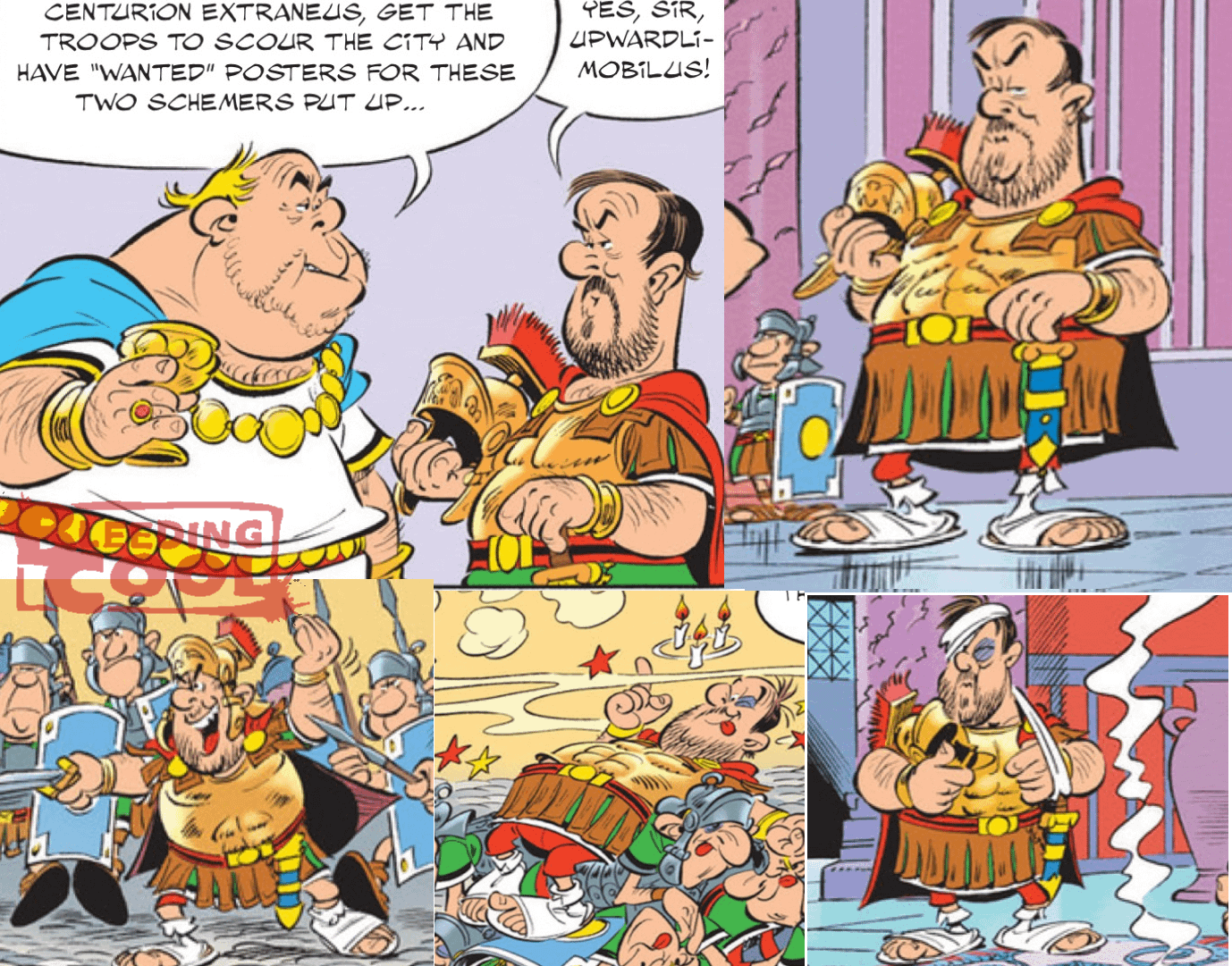
Didier Conrad told me that "it came about because our publisher's a big fan, and as it happened, we love him too, so it came naturally, but he doesn't really have much to do with Portugal or Lusitania, so it was about having fun". Though we agreed that if Ricky Gervais were a Roman centurion, then occupying Portugal wouldn't entirely be out of character. "Any English personality, in fact, because if you look at the British Empire, it's basically the Roman Empire all over." I mean, fair enough, we stole from the best.
Asterix In Lusitania by Didier Conrad and Fabcaro is published today around the world. Sphere has published the British English version today, and Mad Cave/Papercutz will publish the American English version next week on the 28th of October. Asterix, created seventy-plus years ago by the late René Goscinny and Albert Uderzo, is a retelling of French history, the Roman occupation of Ancient Gaul, and a plucky village that holds out against the invaders. Coming a decade after the end of World War II, its origins are quite telling, but far from just appealing to the French, it has become a worldwide hit, the bestselling comic book in the world, with initial print runs of five million often selling through fast. There are usually two types of stories, one in which an aspect of the world comes to the village to challenge it, or one where plucky, clever Asterix, with his dim-witted but big-hearted best friend Obelix, go on a journey to explore another part of this ancient world. The new book is definitely the latter. Fabcaro told me, as well as this being a second volume for him, that" maybe the fact that this was a travel album helped a bit, because you have a new place, a new location, new characters, and new culture to deal with, and so all of that feeds into the story." And Asterix in Lusitania continues its job of exploring the ancient world, its culture and its history, while also including some groan-inducing puns and anachronisms of modern culture transplanted into another time. It's very much a comic book equivalent of the BBC TV version of Horrible Histories, but with a Franco/Belgian take on the world. And in this case, that's ancient Portugal, as Lusitanian Randomaxess (again, the British English translation, others will vary) appeals to the Ancient Gaul village who have successfully fought off the Romans, to help his garum producer Umaminess (ditto, but that is very, vey good as far as fish paste producers go) deaal with false accusations of poisoning Julius Caesar.
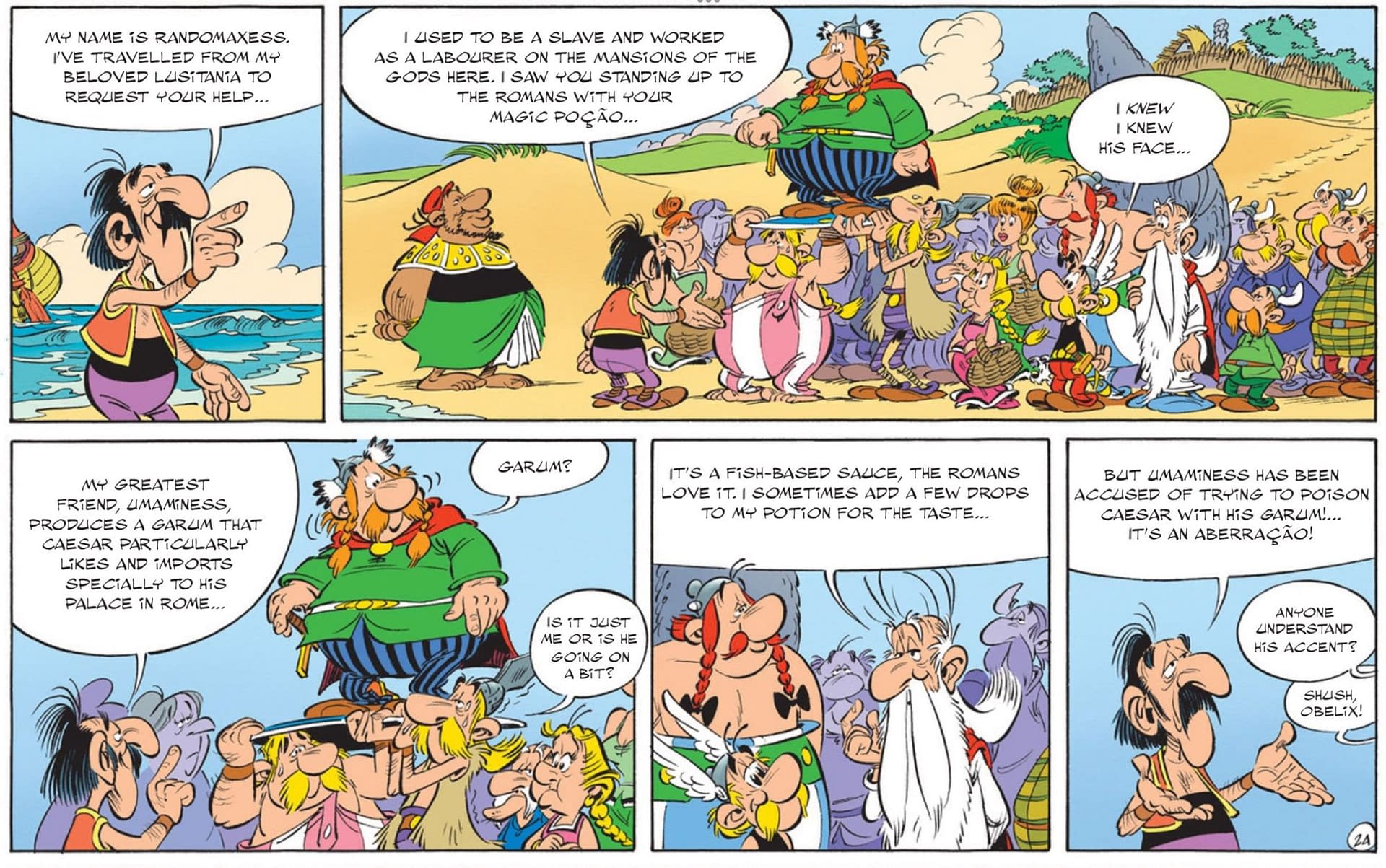
Portugal is a country that resisted Roman rule until it was too late, and saw its own citizens collaborate with their invaders, contributing to a sense of shame and melancholy, but also finding comfort in that ambivalence, a recognition of the weight of history, dubbed saudade, a longing nostalgia for soimething that no longer is, but comforting in its own way, that has become the inspiration for art, culture and a way of life. Heavy stuff for a kids comic? Or is this just what Asterix does, educates, entertains, and appeals to kids, parents and those without kids. Fabcaro told me, "It's about transforming something that's inherently sad into something funny. And so I don't know whether I'm allowed to spoil, but if you take the example of the extreme sadness of the (REDACTED), it's transformed into a weapon against the Romans, and so it becomes this kind of absurd humour. Which is something that Gossini already did quite a bit, quite Anglo-Saxon in that way."
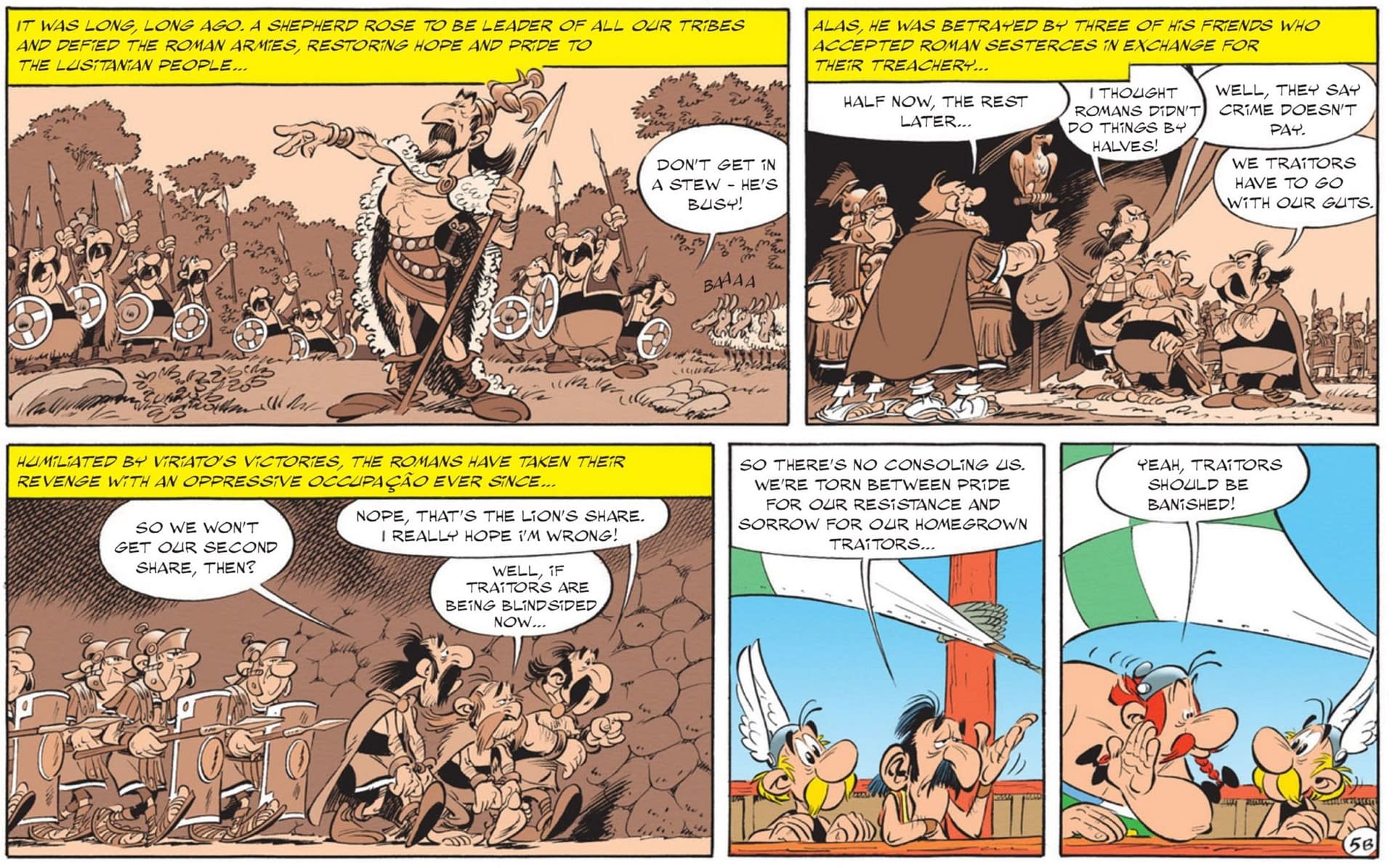
As well as a reference to the Traitors TV series. I asked if there was any intentional reference to the experience of France and the rest of continental Europe during Nazi occupation, with citizens collaborating with occupiers in running the country and the fallout after the war, and while the creators agreed, "obviously a link with the French occupation during World War II", they found that this was true the world over, many countries had been through similar experiences, "there was a Portuguese journalist who asked us why we used this idea of treasonm because as it happens, it's a really big theme in their country and history" and "journalists from Quebec who said they felt particularly moved by the story because they feel like they're a small village resisting invasion right now." And so Asterix and Obelix set sail, on a "slave" galley ship, where the slaves are actually customers, who have signed a rather restrictive contract. They clearly didn't read the small print.
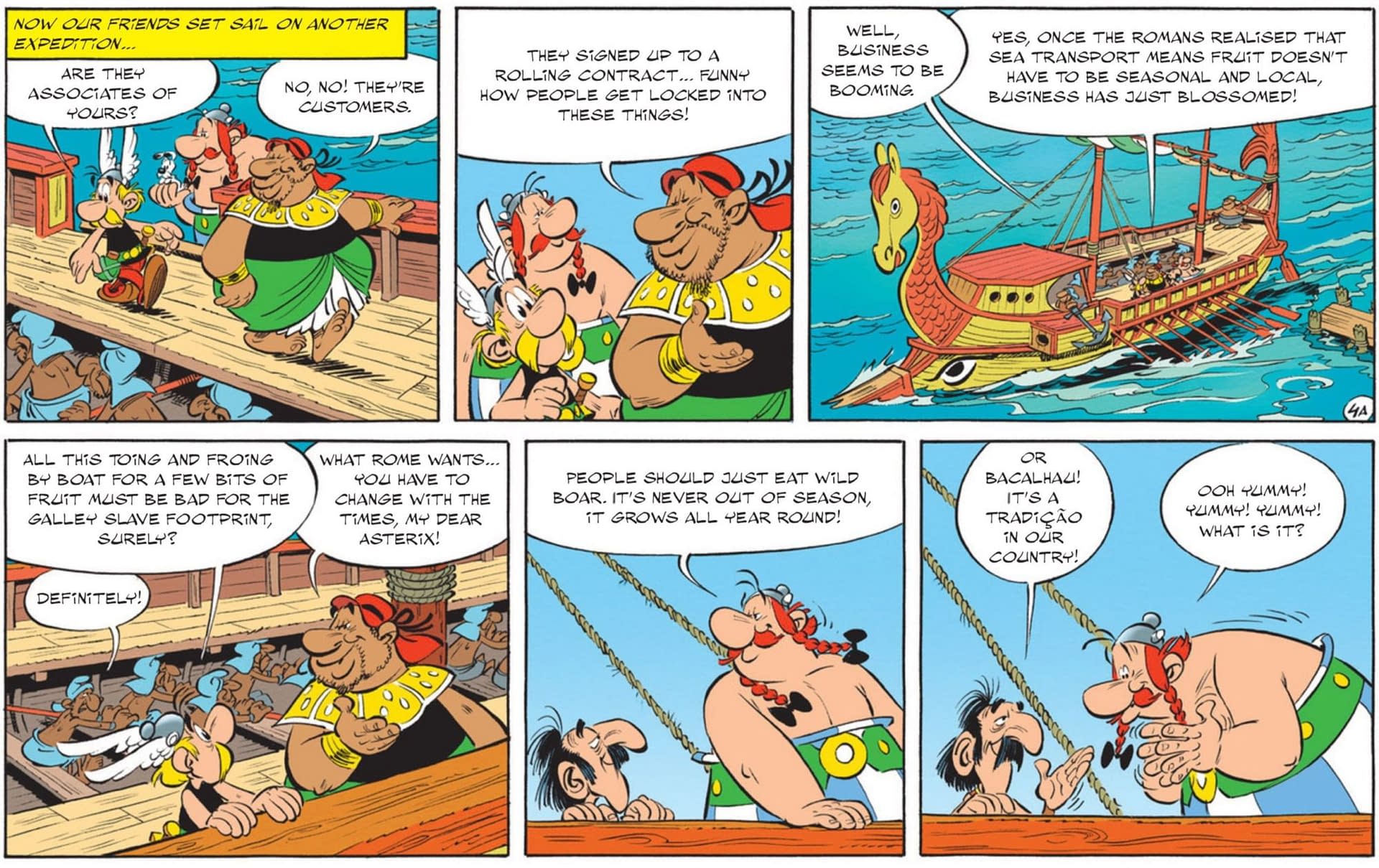
And they even have environmental concerns! Travelling further sees Obelix encounter the same kind of quarry he used back in Obelix And Co, one of my very favourite Asterix books, in which his carving and carrying of menhirs, the mysterious stone objects that litter the museums of France, with no knowledge that they were just used by Obelix to flatten Roman hordes, becomes a lesson on economic demand and supply, principles taught to me at the age of eight.
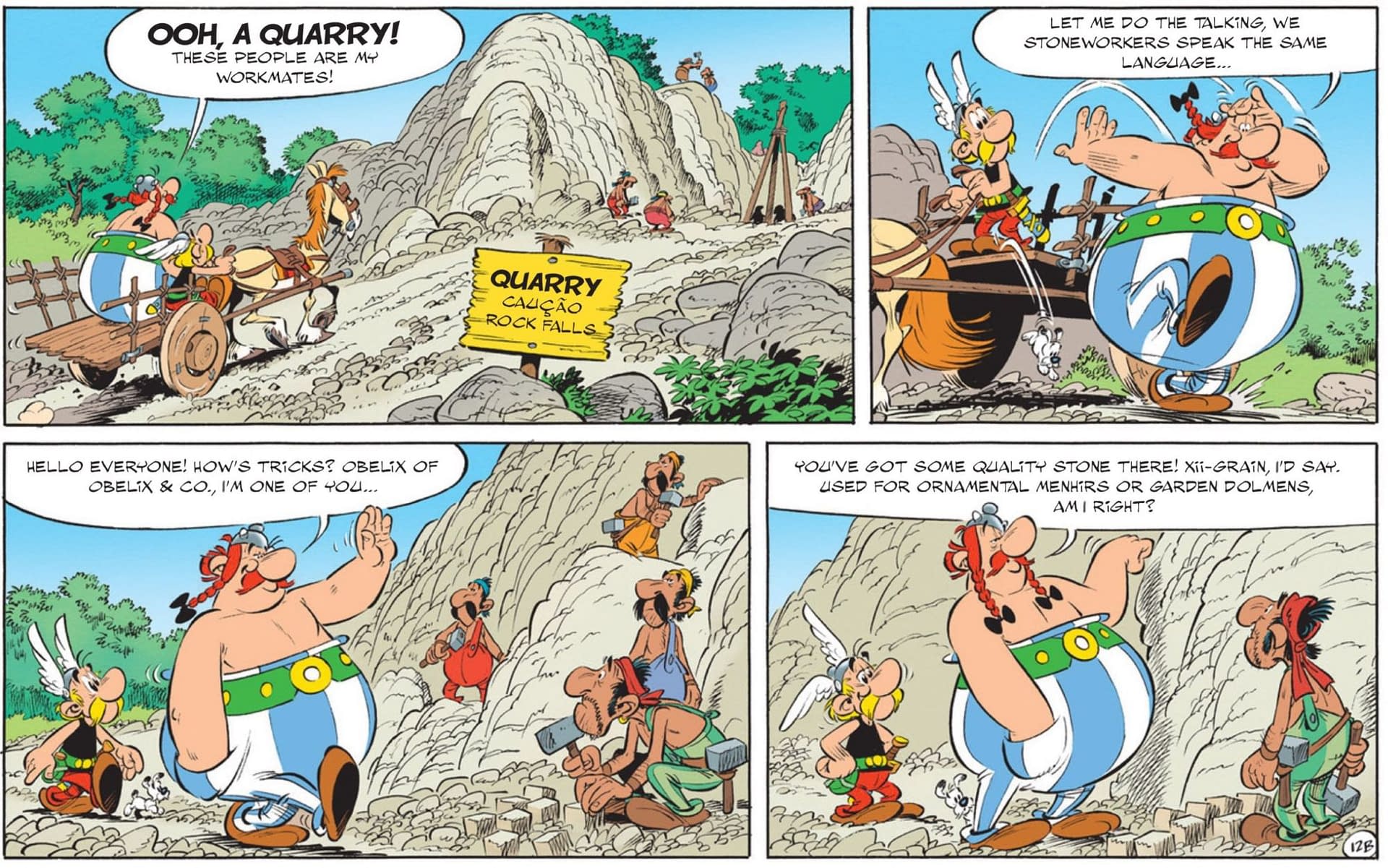
And while this appearance is more to showcase the ancient tiling patterns of Portugal, with piazzas made of mosaic stone flooring, it also provides a historical and social education on their origins, which is pretty much bang on the sestertius.
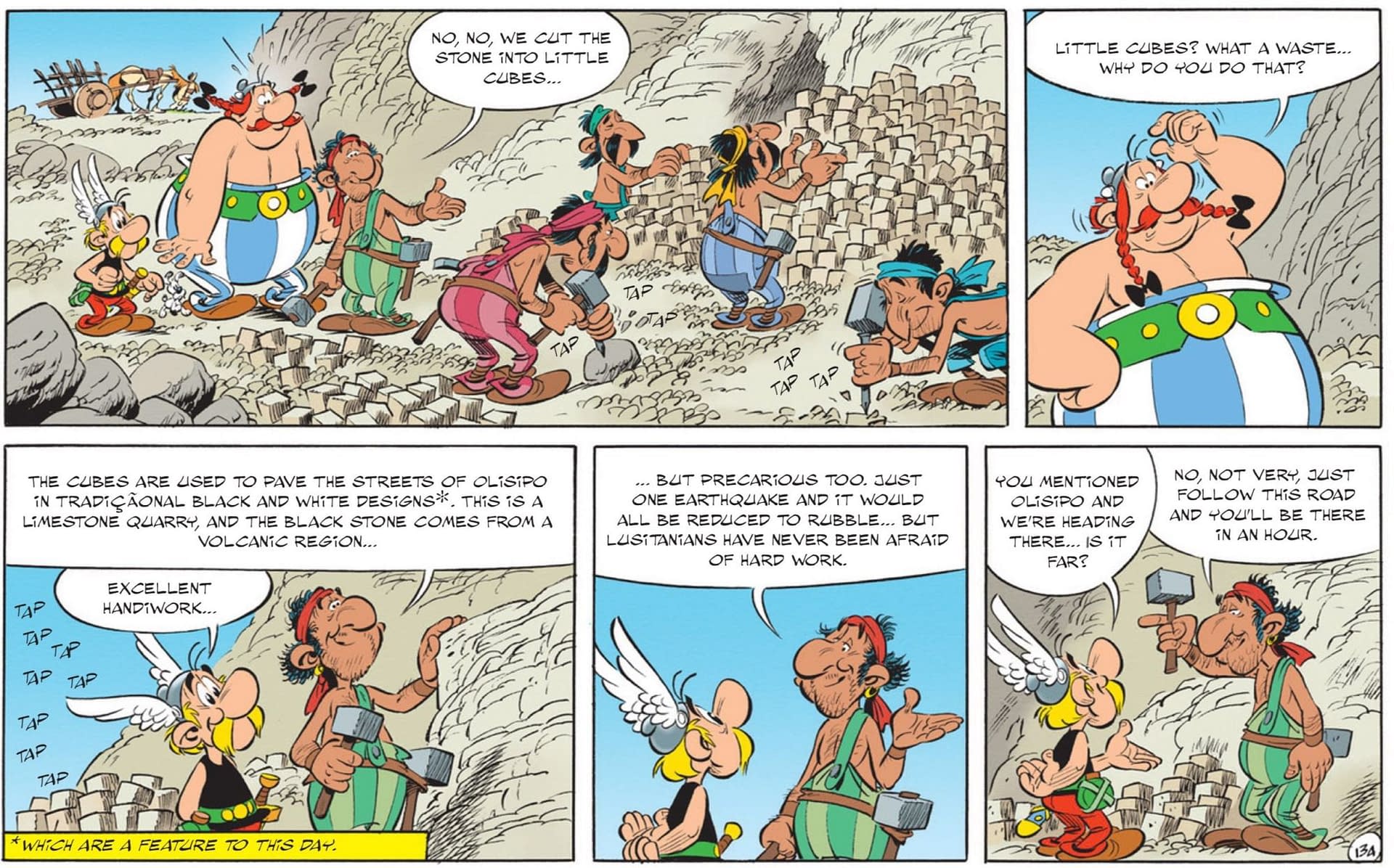
Even as it sets up some jokes from Julius Caesar that tie in his mistress being the Egyptian queen Cleopatra, the Egyptian historical association worshipping cats as deities and the current obsession of scrolling through cat videos. With just a little help with Latin familiarity taken from Shakespeare and Latin textbooks in British public schools.
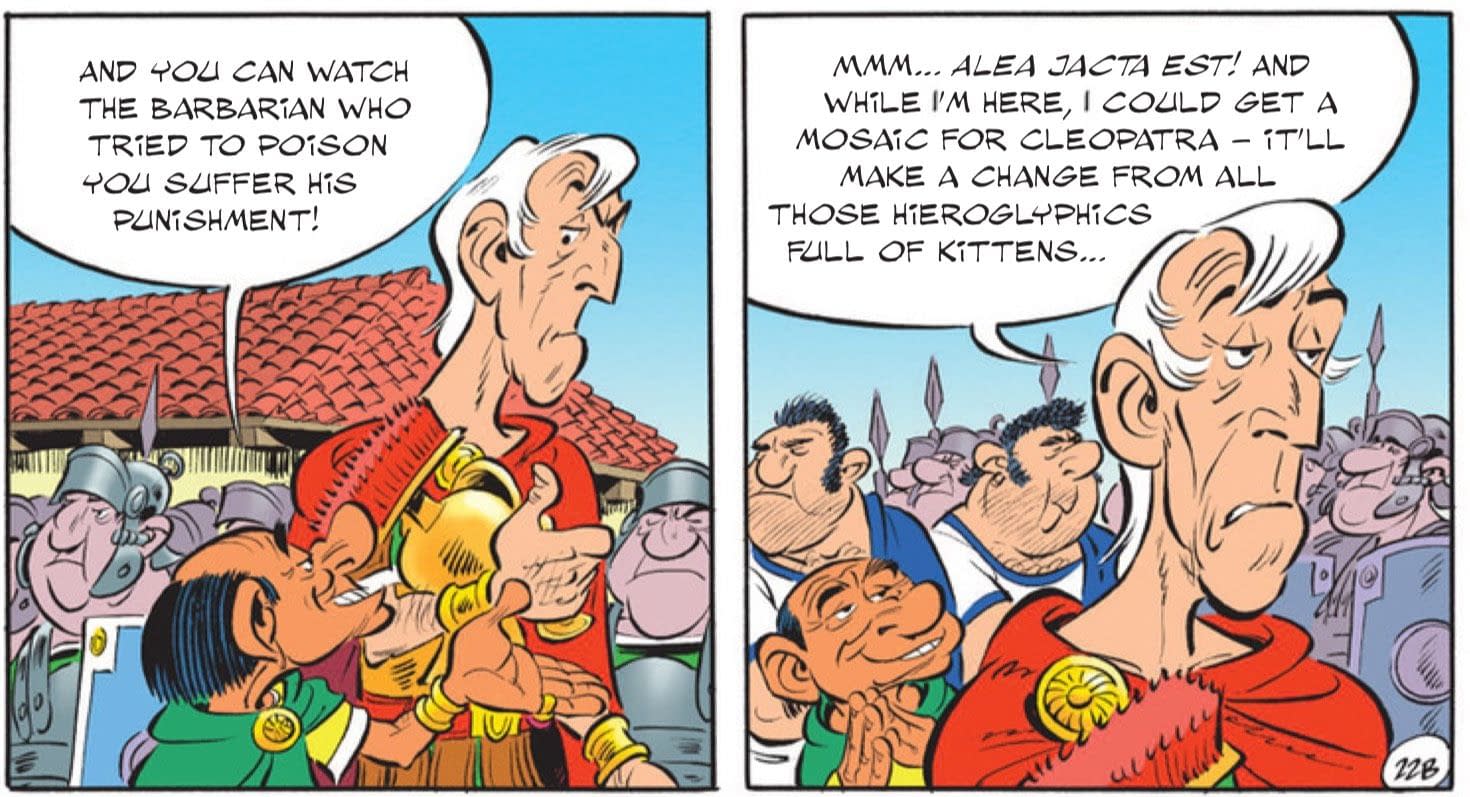
And continuing to play up on the Portuguese association with fish, fish paste and fish sauces, so that we also get economic lessons again, about what happens when industry takes over small businesses, the tricks used to gain economic dominance, both fair and foul, and what it takes to succeed in this modern world, over two thousand years ago. There are economic experts in twenty years' time whose eyes will have been opened for the first time to this sort of thing by reading Asterix In Lusitania. It really is that powerful.
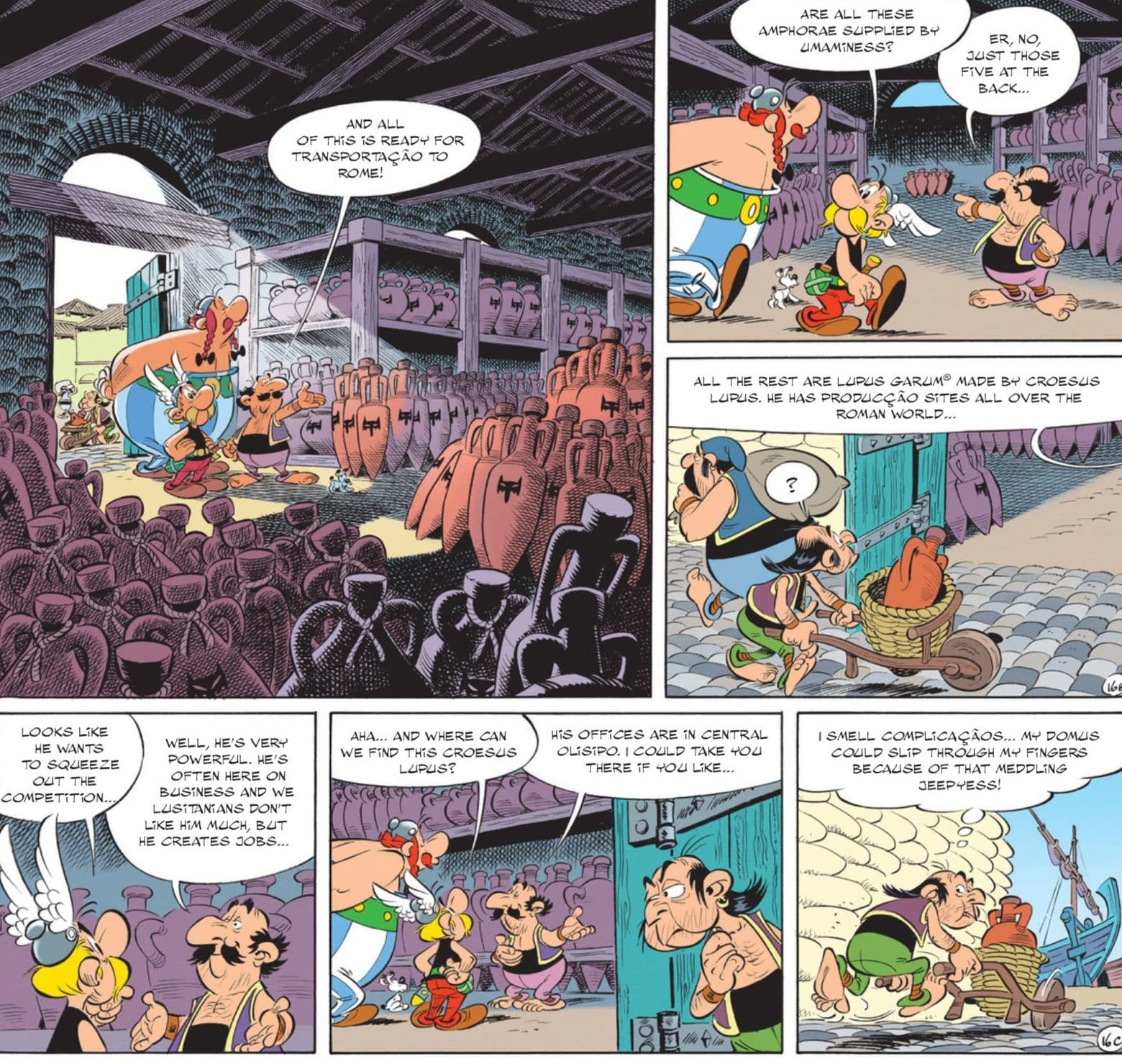
Because here is the thing, usually it is the village albums that are more satirical of modern culture. politics and life, while the travel albums examine how other countries are perceived by foreigners. What Fabcaro and Didier Conrad have been able to do is incorporate some of the satirical aspects of modern life into this travel album, just as they added travel elements to the previous village album, The White Iris. And it works really well. And so, as Asterix and Obelix's presence is noticed in the town, and Ricky Gervais is commissioned to take care of these Gaulish invaders, at the hand of one of the Portuguese traitors…
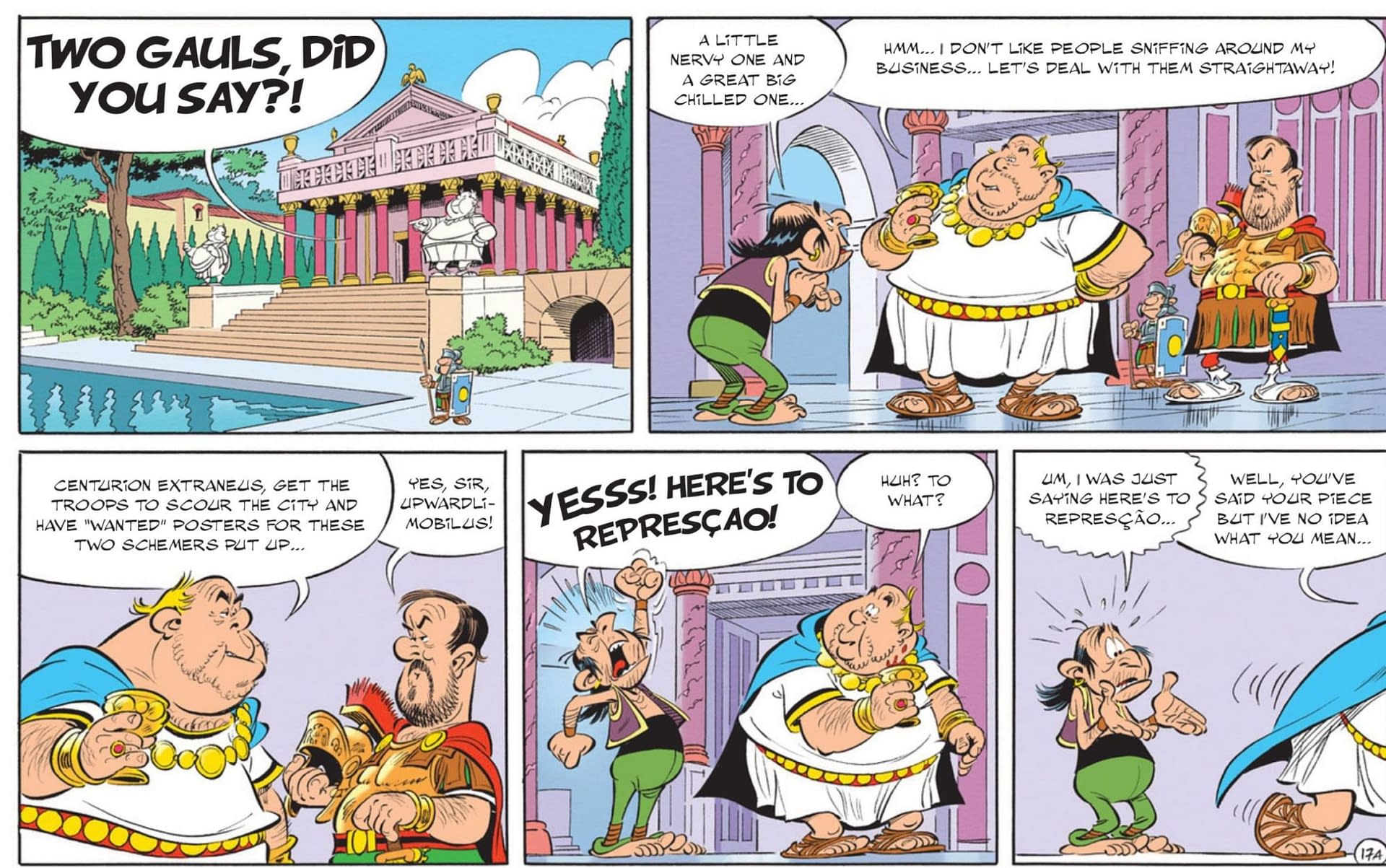
… who it turns out is from a long line of traitors, back to the original betrayal of Portugal to Rome, the idea that such a thing could be passed along the family line, like being a butcher or a doctor, smacks beautifully of Terry Practchett's Discworld with the Thieves Guild and the like, long , proud traditions of malfeasance that one is born into. Then we have the marketing of garum using some familiar advertising lines… as well as the way anyone has to gain entrance to anything these days.

And then a chance to create some of those marketing lines themselves. Something will be changed and twisted for each territory, with I am sure McDonalds is universal, Marks and Spencers might not be.
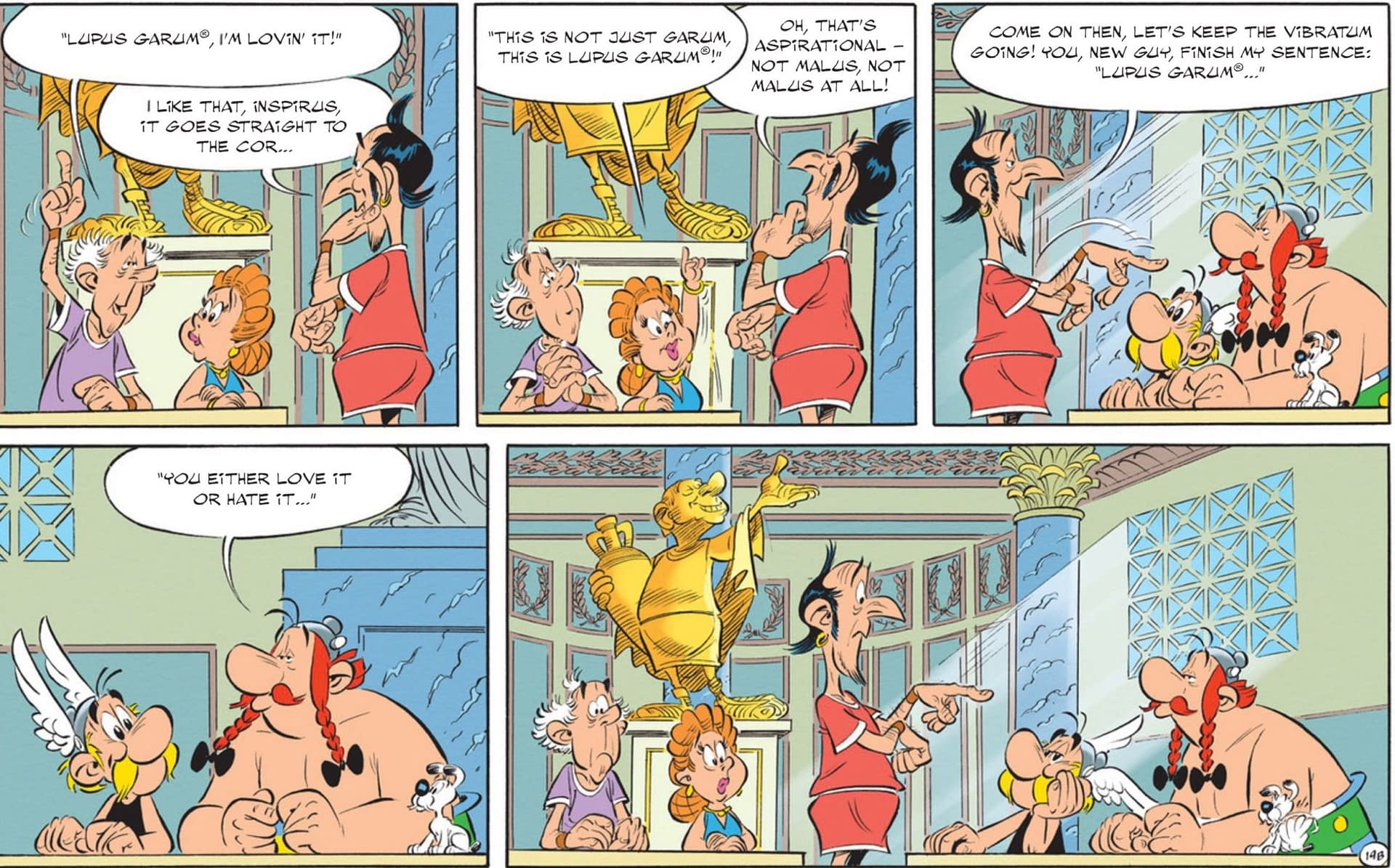
And Marmite's slogan, possibly the closest British product to garum in terms of its national status and opinion towards, it is perfect. I'd love to know what the equivalents are elsewhere. But as they become too obvious, with even Ricky Gervais able to spot them…

… so they have to dress like Lusitanians, with a stereotypical Portuguese look, dark hair, moustache and a high forehead. Fabcaro and Didier Conrad went to pains to tell them, like the original Asterix creators, René Goscinny and Albert Uderzo, they don't mean to mock or laugh at other countries and cultures but to laugh with, using stereotypes that countries recognise about themselves. "Earlier we met with the president of the Franco-Portuguese Association, and they said that it was, you know, really enjoyable and that it sounded right. So I have to admit I was relieved to hear that."
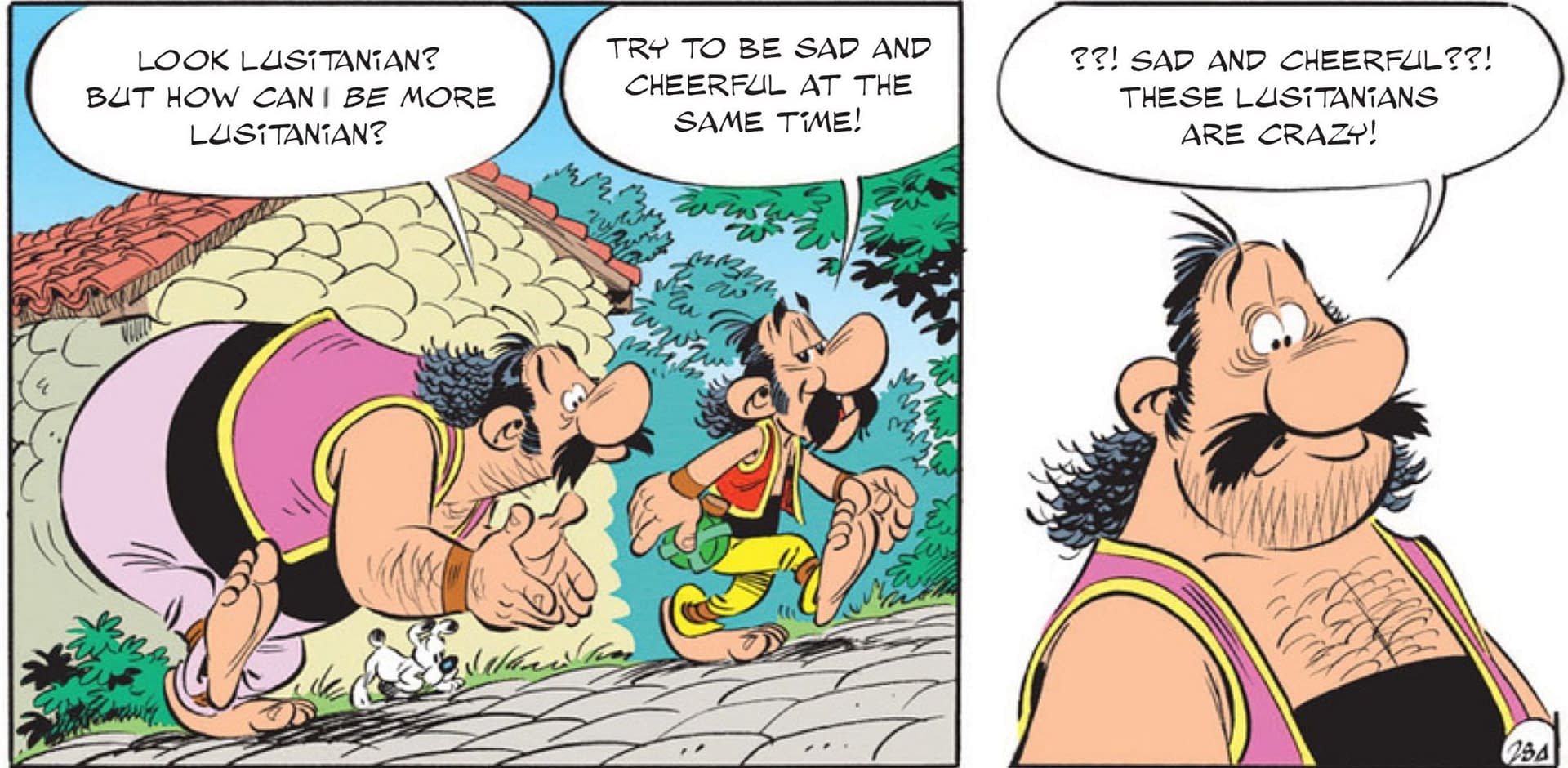
And as for the concept of saudade, Obelix is able to finally capture it, but only in song. However, it's enough to convince everyone of their deception…

Yeah, this is really good. I always miss Asterix when he is not around, and while two years is not long enough for saudade to set in, as there is always the knowledge that I can go back to past volumes, with future volumes to come, there is something in the anticipatikon and the longing, especially in the knoeledge that Conrad and Fabcaro can put together such an extraordinary book, so long after the original creation, and given all the restrictions they acknowledge it places on them. They feel that Asterix fans just love the comics rather than recognise or acknowledge the modern-day creators, and that's something I hope does change. Their work is illuminating in all senses of the word, and I long for more. But for now, I am going to go back and read Mansion Of The Gods, an Asterix comic about gentrification, where one of the Lusitania characters first appeared….
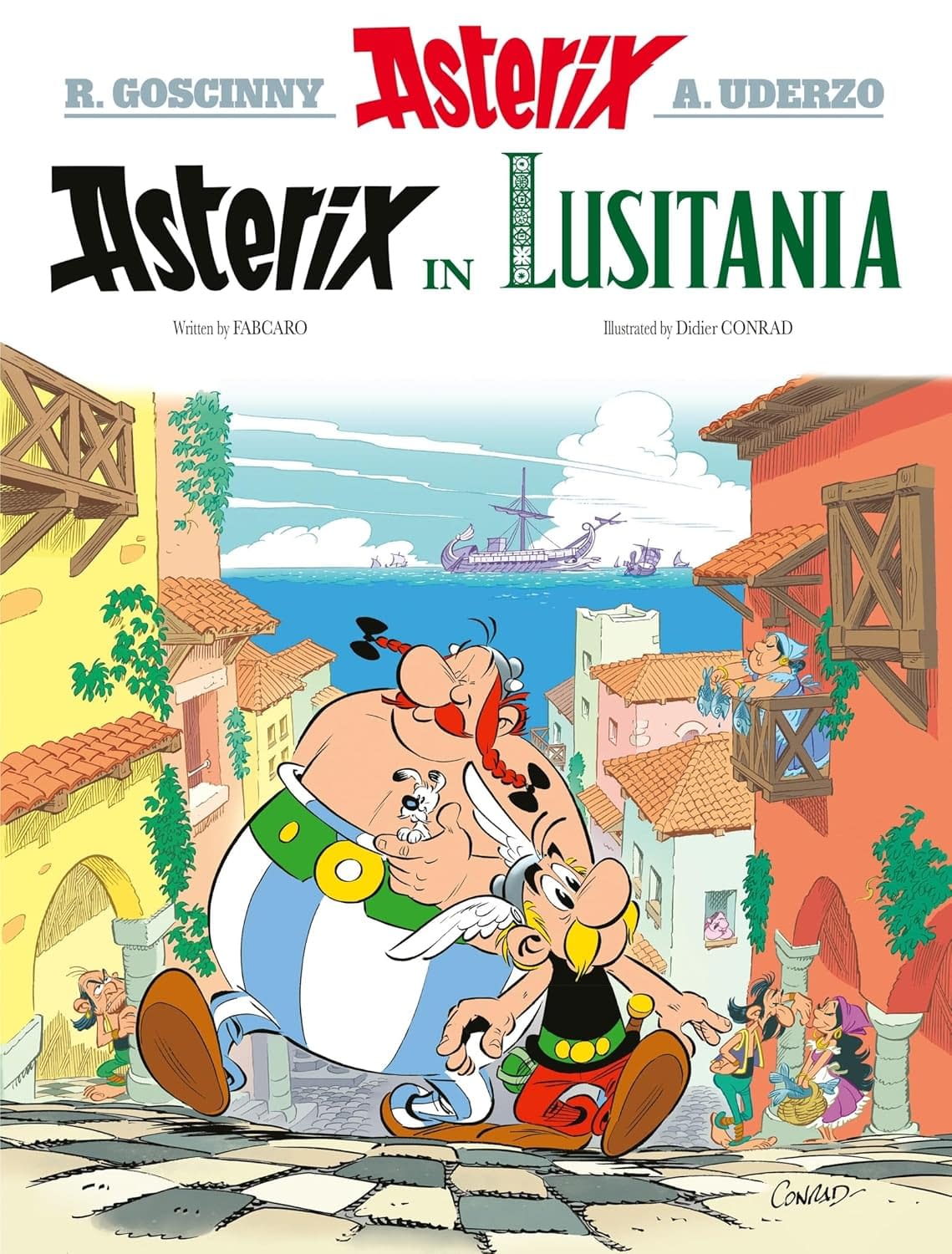
Asterix In Lusitania by Didier Conrad and Fabcaro is published today around the world. Sphere has published the British English version today and Mad Cave/Papercutz will publish the American English version next week on the 28th of October.













